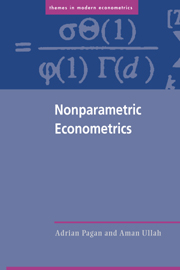Book contents
- Frontmatter
- Contents
- Preface
- 1 Introduction
- 2 Methods of Density Estimation
- 3 Conditional Moment Estimation
- 4 Nonparametric Estimation of Derivatives
- 5 Semiparametric Estimation of Single-Equation Models
- 6 Semiparametric and Nonparametric Estimation of Simultaneous Equation Models
- 7 Semiparametric Estimation of Discrete Choice Models
- 8 Semiparametric Estimation of Selectivity Models
- 9 Semiparametric Estimation of Censored Regression Models
- 10 Retrospect and Prospect
- A Statistical Methods
- References
- Index
1 - Introduction
Published online by Cambridge University Press: 03 December 2009
- Frontmatter
- Contents
- Preface
- 1 Introduction
- 2 Methods of Density Estimation
- 3 Conditional Moment Estimation
- 4 Nonparametric Estimation of Derivatives
- 5 Semiparametric Estimation of Single-Equation Models
- 6 Semiparametric and Nonparametric Estimation of Simultaneous Equation Models
- 7 Semiparametric Estimation of Discrete Choice Models
- 8 Semiparametric Estimation of Selectivity Models
- 9 Semiparametric Estimation of Censored Regression Models
- 10 Retrospect and Prospect
- A Statistical Methods
- References
- Index
Summary
In the past fifty years since it first came to prominence, econometrics has broadened, both in the nature of the data being worked with and in the range of issues that it addresses. Initially econometricians were primarily interested in relations between two or more series, but today they find themselves concerned with measuring volatility of financial returns, durations of events, and the conditional probabilities of decisions, inter alia. A textbook such as Greene's (1997) captures this expansion extremely well. The same textbook also shows that there is still an underlying unity in the way analysis proceeds, in that the method of linear regression and maximum likelihood form the tool kit of an applied econometrician.
In one area of quantitative economics, namely that concerned with the analysis of observed choices made by economic agents in the sphere of consumption and production, it has long been felt that the investigation of questions such as consistency of the data with the maximization principle, homotheticity, and separability of preferences should not be constrained by the need to make precise assumptions about the nature of preferences or production relations. Probably the earliest manifestation of this concern was Samuelson's (1938) development of the revealed preference theory, and since that time there has been a series of contributions aiming to develop a nonparametric approach to the economics of production and consumption, for example, Afriat (1967), Hanoch and Rothschild (1972), Diewert and Parkan (1978), and Varian (1984).
Information
- Type
- Chapter
- Information
- Nonparametric Econometrics , pp. 1 - 4Publisher: Cambridge University PressPrint publication year: 1999
Accessibility standard: Unknown
Why this information is here
This section outlines the accessibility features of this content - including support for screen readers, full keyboard navigation and high-contrast display options. This may not be relevant for you.Accessibility Information
- 1
- Cited by
